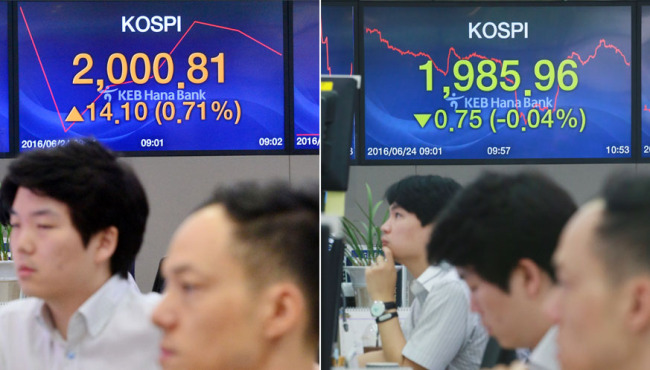The “Leave” outcome in the U.K. is expected to further overshadow the prospects of the Korean economy, which is already facing a slew of negative outlooks on employment, inflation and exports, analysts say.
An exit from the European Union is likely to slow Korean exports to its free trading partner, as Korea and the U.K., as well as the EU, will have to renegotiate the terms of their trade pacts and tariffs separately, now that the world’s fifth-largest economy will have to start talks with the Union for departure.
Analysts say the U.K. and the EU are expected to engage in their negotiations with a minimum impact on the global economy. However, Korea will inevitably face volatility and see its growth further slowing on weakened sentiment both at home and abroad.
 |
Employees of KEB Hana Bank monitor key economic indices on Friday, as the United Kingdom works on its referendum to exit the European Union. Yonhap |
“Under European law, the formal withdrawal process should take place over a two-year period, although this can be extended by mutual agreement. The broader process may take longer as both sides seek to mitigate the impact of Brexit,” said Moody’s Investors Service in a report.
“Heightened uncertainty during the negotiation period will likely dent investment inflows and confidence, weighing on the U.K.’s growth prospects -- a credit negative for the sovereign and other U.K. debt issuers,” it added.
With “Brexit” realized, which led global equities and currencies to tumble, analysts forecast the benchmark KOSPI to fall as low as 1,800. Hyundai Securities and Hana Financial Investment forecast the index to drop near 1,850, while Samsung Securities and Kyobo Securities did not rule out the possibility of the KOSPI touching 1,800 on weakened confidence and negative outlook for the Korea economy.
The Korean KOSPI lost more than 3 percent, ending at 1,925.24 last Friday, with the Dow Jones Industrial Average losing 3.39 percent to sit at 17,400.75; Nikkei 225 dropping 7.92 percent to 14,952.02; and the FTSE 100 losing 3.15 percent to 6,138.69.
The U.K.’s vote to leave, along with socioeconomic impacts from corporate restructuring, job losses and low inflation, will also inevitably make the Finance Ministry readjust its growth forecast this year. Given the worsening situation, Korea’s initial 3 percent growth projection is out of reach, and that many analysts are expecting the country is likely to grow around 2 percent.
Financial authorities held a meeting over the weekend following the U.K. vote to monitor the market and come up with contingencies, which will be taken into account as the government prepares a new set of economic policies for the second half of this year.
By Park Hyong-ki (
hkp@heraldcorp.com)




![[Herald Interview] 'Trump will use tariffs as first line of defense for American manufacturing'](http://res.heraldm.com/phpwas/restmb_idxmake.php?idx=644&simg=/content/image/2024/11/26/20241126050017_0.jpg)

![[Health and care] Getting cancer young: Why cancer isn’t just an older person’s battle](http://res.heraldm.com/phpwas/restmb_idxmake.php?idx=644&simg=/content/image/2024/11/26/20241126050043_0.jpg)

